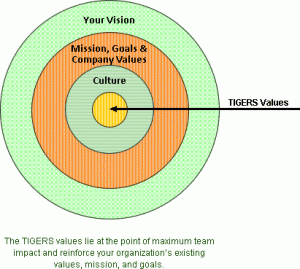
In most areas of life, including the workplace, employees start at the end. They picture where they want to be. They determine what they want to have or what they want their life to look like.
However, just like annual New Year resolutions, if you don’t create an action plan for the desired end result, then it’s extremely unlikely that you’ll ever end up successful. If you truly want workplace success or dreams to be a reality, then create goals with measurable milestones. Then track your progress until you succeed. The bigger the goal, the more milestones to celebrate. Sure, failure sometimes happens. However, with a plan in place, persevere and obtain the end result that conquers goals.
Team building strategies for achieving workplace success and personal goals
The following goal-setting strategies help leaders improve their teams, track progress and reach their goals.
Work hard to achieve workplace success.
This may seem like a no-brainer. However, many people think that people become successful because they are talented. While this is true to some extent, talent can be overridden by hard work (or the lack of it). Therefore, your work ethic says a lot more about the workplace success that you experience than your talent does.
For example, orchestra members are extremely talented with their instruments. But their performance polish probably didn’t crop up overnight. The beautiful music that they successfully execute comes after many hours and years of extensive practice.
The same holds true for many CEOs and leaders of successful companies. Most of these leaders weren’t just handed their positions for no-good reason. They worked hard on their skills and moved up the corporate ladder to achieve workplace success. While some of their leadership qualities may be innate, you can be sure that they’ve taken the time to learn, grow and improve their skills to get to where they are. You can reach your goals, too. Let go of the idea that you need raw talent to succeed and you work hard to hone your skills and improve in your goal accomplishment.
Workplace success requires being specific.
Most people are guilty of creating broad goals that aren’t easily tracked. Goals like getting a promotion or becoming more genuine or empathetic are common. Goals like these are likely to fail because they aren’t measurable and your progress can’t be tracked.
If you want to reach your goals, get specific about what you want to achieve. For example, my goal is to listen more with curiosity and react less so I can under stand what a colleague is communicating so I understand what they are saying and feeling before I respond. This is a realistic and measurable goal that you can practice daily with your children, spouse and stressed co-workers.
Here’s another example. Perhaps you have a goal of making more money through a promotion. However, you are likely to give up on your ambitions if you’ve struggled to achieve this goal for several months or years. Instead, shift your focus onto ways to continually improve yourself and your performance. These are activities you have complete control over. When you master these activities, you will be able to identify measurable performance milestones that make you an invaluable part of your team.
If you rely on your employer to provide training for you rather than seeking self improvement, you depend on others to validate you. Instead, own your own power and personal control. Once your performance improves, you will be more likely to get that promotion and raise.
Likewise, if you strive to be more genuine, narrow your scope. Reflect on specific workplace success hurdles that require more assertiveness. For example, set goals to , reduce the amount of responsibilities you agree to. Create a plan that works with the areas where you struggle, and track your progress in each area.
Share your goals with others who desire workplace success.
One of the fastest ways for a goal to die is by keeping it a secret. You can ask a trusted work friend or your supervisor to hold you accountable. If other people know about your goal and regularly check in with you, then you are more likely to take the necessary steps to reach that goal. Likewise, if you are also helping your coworker to achieve a goal, one set of check in questions include:
- What little success did you achieve last week toward your goal?
- What would you do differently?
- What are you focusing on this coming week?
Ultimately this is a natural to want to protect yourself – from judgment, concern, and advice – from others.
Therefore, in working toward workplace success it is important to tune out the naysayers. Only focus on improving yourself, setting milestones, tracking your progress and taking the necessary steps to reach your goal. None of that other stuff matters. So put your goal out there, for yourself and a trusted colleague to see. Work toward making it a reality, regardless of what others may say. That’s the road map to workplace success.
Everyone has goals. The more specific you are, the more likely you are to reach yours. Start by implementing some team building strategies for setting goals and reaching them. Focus on creating measurable milestones so you can track your progress.
Additional strategies include:
- Place importance on working hard;
- Get specific about how you are going to achieve your goal; and,
- Sharing your goal with a trusted colleague to hold yourself accountable.
With these strategies, you can achieve workplace success and enjoy the success you’ve earned.
Care to dig deeper into this conversation?
Here are some additional resources that focus on workplace success.
- 10 Ways You Can Model the Success of Millionaires
- 3 Career Resolutions You’ll Almost Always End Up Breaking
- Do You Have What It Takes To Dream Big?
- 6 Principles That Build High Impact Teams self study management training
- How To Achieve Business Success
Copyright, TIGERS Success Series, Inc. by Dianne Crampton
About TIGERS Success Series, Inc.

We specialize in training your managers in group facilitation methods that build workforce cooperation and high performance team dynamics. Scaled to grow as your organization and leadership performance grows, our proprietary Team Behavior Profile and Managment training workshops are based on the six principles we have found to be the right mix to make this happen.
The TIGERS 6 Principles are Trust, Interdependence, Genuineness, Empathy, Risk and Success. Born from our many years of business, psychology, and educational group dynamic research, and subsequent four years of independent evaluation, we instill and sustain behaviors that improve work group performance and talent retention for measurable ROI.
TIGERS has served committed leaders who desire enhanced cooperation among departments, teams, managers and individual employees. This heightened level of cooperation leads to improved revenue, purpose, commitment and impact. Employees quit companies because they don’t get along with leaders and co-workers. Work culture refinement and behaviors that build strong relationships erase this trend remarkably fast.
For more information or to request a presentation to your group or association, call 1+541-385-7465 or visit https://corevalues.com .